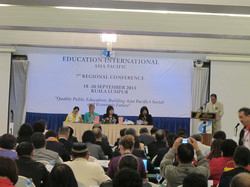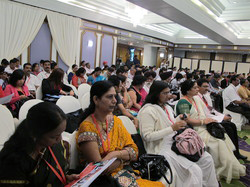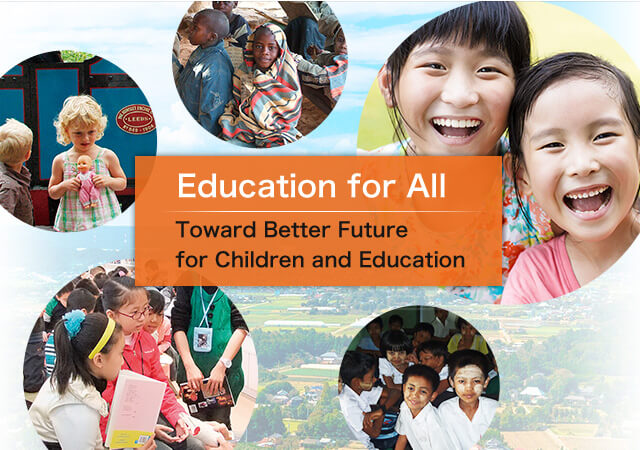- Home
- Education International Asia Pacific Regional Conference
Quality Public Education;Building Asia Pacific’s Social and Economic Future
ABOUT JTU
Education International Asia Pacific Regional Conference
Quality Public Education;Building Asia Pacific’s Social and Economic Future
2013/10/29


Education International Asia Pacific (EIAP) Regional Conference was held on September 18-20 in Kuala Lumpur, Malaysia. This conference, the highest decision-making body for EIAP, is held every 4 years and an important opportunity for affiliated organizations to discuss what have achieved during the last 4 years and what to do for this coming 4 years as well as to elect Regional Committee members.
At this conference, 71 organizations of 36 countries/regions gathered. The theme ‘Quality Public Education; Building Asia Pacific’s Social and Economic Future,’ reflected Millennium Development Goals that 164 countries committed to achieve by 2015. One of the goals is ‘Education For All (EFA)’ which seemingly can not be achieved as committed.
From Japan Teachers’ Union (JTU), attended 13 members the conference, including 8 members from headquarter and 5 members from the affiliated unions.
At the opening ceremony, Ms Susan Hopgood, EI President, had keynote address. She mentioned conflicts between religions and educational rights as one of the biggest challenge for teachers unions. As symbolized by the attack against Malala of Pakistan, there are some extremist who deny to girls/women access to education, and commit violence in some cases. President put emphasize that every child needs to be ensured the right of education as basic human right. Also, she suggested that many countries were affected by financial crisis and adopted austerity policies. When considering this issue, we need to refer to the EI survey on corporate taxation. It was clear that there were multi-national companies and billionaires avoid paying taxes through different techniques of tax ‘minimization’. This means trillions lost of public revenues, decrease in educational budgets, and even marketisation and privatization of education. She calls for international organizations to take political will to create framework for international corporate tax reform.
The following was Shashi Bala Singh, Chief Coordinator of EIAP, who stated on achievements and challenges of the region. Asia Pacific varies from Islamic countries of Arabian Peninsula to islands of Pacific and has plenty of geographical, ethinical, cultural and linguistic diversities. Chief Coordinator stressed that we considerably achieved toward the realization of EFA while the de-professionalisation trends have occurred. Also, she emphasized that discrimination against women/girls deeply was rooted in this area and the gender equity should be continuously one of the pillar policies. Introducing violations of trade union rights not only in emerging countries but also OECD ones, she indicated that EIAP would make more sound solidarity with ITUC, ILO and other stakeholders.
During sub-regional session for North Asia, JTU discussed with representatives from Mongolia, Taiwan, Hong Kong and Korea and shared views and situations on challenges for trade unions and educational issues. Mr. Liu of NTA, Taiwan, served as Chair and Mr. Okamoto, General Secretary of JTU, reported to the plenary. He reassured the importance of social dialogues and called for solidarity among affiliated organizations.
The representatives of Sri Lanka, Nepal, Philippines, Solomon Islands, Kiribati, Australia and Japan attended the breakout session ‘Building a just and equitable global society through investment in education.’ They exchanged views on educational issues such as inadequate educational budgets and necessity of completely free compulsory education. At the plenary, they recommended we should promote social dialogue and regard education as human right to build a just and equitable society.
At this regional conference, Mr. Nakamura, former-President of JTU, resigned and Mr. Okamoto was newly elected as Chair. Mr. Nakamura exerted himself for solidarity in Asia Pacific region and ensuring education for all children for the 4 terms of 10 years. Mr. Okamoto had inaugural greeting ‘It is our mission in 21st century to build up society which respects peace, human rights, environment, mutuality and democracy. Education is the most important above all to achieve it, and schools should be the symbolic entities.’


